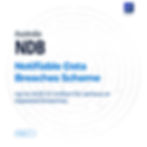The Cost of Non-Compliance in Cybersecurity
- bakhshishsingh
- Aug 30, 2025
- 3 min read
In today’s digital-first world, data is one of the most valuable assets a business owns. But with great value comes great responsibility — and failing to protect sensitive information can lead to crippling financial penalties. From Europe’s GDPR to the U.S. HIPAA and CCPA, global regulators are enforcing stricter data protection laws than ever before.
For organizations, non-compliance doesn’t just mean reputational damage; it can mean millions of dollars in fines, legal battles, and the loss of customer trust. Let’s explore the biggest regulatory frameworks and the potential penalties they carry.
GDPR – Europe’s Heavyweight Regulation

The General Data Protection Regulation (GDPR) is one of the most well-known and far-reaching privacy laws in the world. It applies to any business handling the personal data of EU citizens, regardless of where the company is located.
Penalties under GDPR can reach up to €20 million or 4% of a company’s annual global turnover, whichever is higher. For global enterprises, this could mean billions.
GDPR violations can stem from inadequate consent mechanisms, failure to report breaches, or misuse of personal data. Beyond financial penalties, organizations risk losing customer trust — a cost that can be even harder to recover.
CCPA – Protecting California Consumers

The California Consumer Privacy Act (CCPA) is another regulation with teeth. It gives California residents greater control over how their personal data is collected, shared, and sold.
Businesses face fines of up to $7,500 per intentional violation and $2,500 per unintentional violation. While these numbers may seem smaller compared to GDPR, violations can add up quickly when thousands of records are involved.
With California often leading the way in U.S. privacy legislation, CCPA compliance sets the foundation for adapting to future state-level laws.
HIPAA – Safeguarding Health Information

In the United States, the Health Insurance Portability and Accountability Act (HIPAA) governs how healthcare providers and their partners manage patient data.
HIPAA fines can climb to $1.5 million per violation category, per year. For hospitals, insurers, and healthcare tech firms, non-compliance could mean not only financial devastation but also putting patients at risk.
PCI DSS – Payment Security on the Line

For businesses processing card payments, the Payment Card Industry Data Security Standard (PCI DSS) sets critical requirements for protecting cardholder data.
Non-compliance fines range from $5,000 to $100,000 per month until compliance is achieved. In addition, businesses can face restrictions from card networks or even lose the ability to process payments altogether.
FTC – Federal Oversight of Consumer Protection

In the U.S., the Federal Trade Commission (FTC) enforces penalties for unfair or deceptive practices, including cybersecurity failures. While fines vary, they can climb into the millions of dollars depending on the case.
Recent FTC actions have highlighted the importance of transparent privacy policies, secure data handling practices, and proactive risk management.
NDB – Australia’s Data Breach Law

The Notifiable Data Breaches (NDB) Scheme in Australia requires organizations to notify affected individuals and regulators of serious data breaches.
Penalties for serious or repeated violations can reach AUD 2.1 million, reinforcing the global trend of holding businesses accountable for data protection.
NIS2 – Strengthening Europe’s Cyber Resilience

The Network and Information Security Directive 2 (NIS2) applies to organizations in critical sectors such as energy, transport, healthcare, and digital infrastructure.
Non-compliance can lead to fines of up to €10 million or 2% of worldwide annual turnover, whichever is higher. NIS2 reflects Europe’s commitment to raising cybersecurity standards across industries that keep society running.
Why Compliance is a Business Imperative
These fines highlight a critical truth: compliance is not optional. As regulations grow more complex, businesses must prioritize data protection as part of their core operations.
Compliance not only helps avoid penalties but also builds trust with customers, partners, and regulators. In a world where a single data breach can make headlines, being compliant means being prepared.
Final Thoughts
From GDPR in Europe to HIPAA in the U.S. and NDB in Australia, global data protection laws carry serious financial and reputational consequences for businesses that fall short.
At Allendevaux & Company, we help organizations navigate this complex regulatory landscape. From risk assessments and compliance audits to training and incident response, our team ensures that you stay protected, compliant, and resilient.
Avoid million-dollar mistakes — click here to invest in compliance today to safeguard your business tomorrow.

